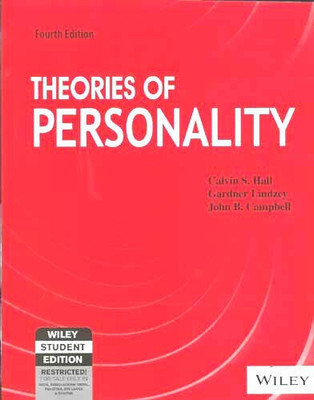Theories of Personality(English, Paperback, Calvin S. Hall Gardner Lindzey John B. Campbell)
Quick Overview
Product Price Comparison
A go-to guide for everything related to personality theories, Theories of Personality provides an incisive exploration of the same. In the Fourth edition the book has included the latest research on personality theories and new chapters on social learning theories. It has been restructured into the four paradigms of Psychodynamics, Personality Structure, Growth and Perceived Reality and Learning. Summary Of The Book Theories Of Personality 4th Edition is a comprehensive academic journal recording all theories engaged through the diverse paradigms of personality. The book touches upon the four major theories in an all inclusive manner. It doesnŌĆÖt just table out features and characteristics associated with the theory but goes into the historical background and lays out a brief biographical sketch of the theorist involved with the same. It also delves into investigations that have been stimulated in the course of exploring these theories and ends with a critical evaluation of every one of these theories. The Psychodynamics sections engages Freud and Jung in equal measure stating their investigations into the theory of psychoanalytic behaviour. Adler, Fromm, Horney, and Sullivan cast their die into the game with their perspectives on social psychological theories. In the next section that dives into the theory of Personality Structure Murray, Allport, and Cattell are the primary investigators. They lend their expert knowledge into the facets of the Individual, Personology and the Factor Analytic Trait Theory. Perspectives on Perceived Reality has one major proponent, Carl Rogers, who achieves much in elucidating on the Person-Centred Theory. The last section on Learning branches out into the Operant Conditioning Theory, the Stimulus-Response Theory and the Social Learning Theories. Skinner, Dollard & Miller and Bandura respectively sketch and fill in all the details pertaining to the aforementioned theories. Theories Of Personality ends with a section on perspectives and conclusions as drawn from the various theories that are discussed comprehensively through the book. This fourth edition goes ahead in attaching the newer proponents to each section. Erikson embellishes upon his Contemporary Psychoanalytic Theory and Eysenck explores the Biological Trait Theory in the Psychodynamics and Personality Structure section respectively. The book also includes forethoughts on the Eastern Personality Theories and Buddhism as an inherently unique personality theory. It is a much lauded text in academic circles because of its relevance even now and the comprehensive manner in which it deftly maneuvers through diverse subject matter.┬Ā About The Authors Calvin Springer Hall is a renowned psychologist whose systematic research stemmed from his rigorous education in the field of dream interpretation. He has authored several books like The Primer Of Freudian Psychology and The Primer Of Jungian Psychology. His research on behaviour genetics and temperament led to several contributions. His chapter in the Handbook Of Experimental Psychology is often touted to be one of the founding statements of modern genetic theories.┬Ā He was born in Seattle, Washington and after studying psychology as his undergraduate degree he worked with renowned Behaviorist, Edwin Guthrie. After receiving his Ph.D. he taught as an assistant professor at the University of Oregon and then went on to teach at various universities for over twenty years. During this time, he focused his research in the field of dream interpretation and developed a coding system that changed the objective study of dream content radically. He died in 1985, passing on his legacy in genetic research to future psychologists. Gardner Lindzey was a prolific writer on relevant matters related to the discipline of Psychology. He has been majorly credited for his editorship on The Handbook Of Social Psychology among the host of other scholarly material and reviews associated with Psychology. His contributions as a psychologist, editor and former President of the American Psychological Association helped build an expansive network of scholarly exchanges and scientific collaborations. He died on Feb 4, 2008 and is survived by his companion, his daughter, four sons and six grandchildren. John B. Campbell is primarily a personality psychologist and his contributions in the editorship of Theories Of Personality helped buffer comparative analysis related to personality theory. He has authored and co-authored several academic texts in the realm of personality theory. His sole authorship lends credit to his book, Modern Personality Theories: What Have We Gained, What Have We Lost? published in 2008. He works as a professor of psychology in the Franklin and Marshall College. He holds a Ph.D. in personality psychology from the University of Michigan.


